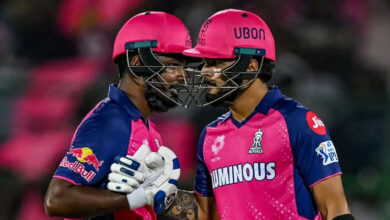How Xabi Alonso stopped the goal machine Harry Kane against Bayern Munich, and is making heads turn steering the wheel at Bayer Leverkusen | Football News

After the final whle blew, capping a symbolic night when Bayer Leverkusen thrashed Bayern Munich to stretch their lead to five on the Bundesliga chart, manager Xabi Alonso dragged his support staff to the middle of the pitch. The Spaniard and his entourage joined the tired but jubilant players in the middle and they walked towards each stand to thank the players. The moment was so eloquent that some of the shocked Bayern fans applauded Alonso’s gesture. Alonso, once Bayern’s own, is not only winning games but also winning the hearts of football fans.
The grace and calm always exed. Few midfielders in modern football could seamlessly straddle the varied roles of a midfield, he could snatch the ball from the opponent’s feet, with not so much of a swish as a touch; he could tigerishly hold onto the ball, without breaking a sweat or straining a muscle; he could tackle, pass, dribute (his biggest gift) and score (some long-range worldies he has netted), he could be the most visible and invisible player on the field. His manager at Bayern Munich, Pep Guardiola, once positively likened him to a chameleon, for his adaptability. His physicality stood out, sometimes it obscured his elegance too.
No wonder then that he frictionlesly fitted into the frameworks of different, often antithetical managers and teams. From a midfield don (it was his nickname too) in Real Sociedad, his home-club, he established an efficient alliance with Steven Gerrard at Rafa Benitez’s hardworking group that scripted the Miracle of anbul. He played tiki-taka with Spain to conquer the world; he would be the axis of Jose Mourinho’s quicksilver counter attackers, before he slotted into the heart of Guardiola’s shape-changing Bayern Munich. He has won everything one could have for his club and country, and in the journey worked with some of the finest managers of his time.
Some of the managers noticed the managerial spark quite early in his career. “He would see the game through the eyes of a manager. He had the vision and format, and talked tactics in finer details. He was the leader of leaders, though you would not always see that on the field,” Carlo Ancelotti, another celebrated manager who Alonso has played under, would observe. He used to pester Guardiola’s coaching staff, trying to gather as much knowledge as possible. “I just tried to be curious about the manager’s work,” Alonso would once say.
This revelatory season, where his Leverkusen has yet to lose a game and won 17 of their 21 fixtures, he has shown the finer virtues of all the legendary teams and managers that he has played with. Like prime Benitez, his recruiting was sharp. He lost his most valuable asset Moussa Dia, but the 60 million Euros deal helped him leverage funds to purchase Granit Xhaka, Álex Grimaldo, Victor Boniface and Jonas Hofmann, the perfect budget players for his tactics. Xhaka and Hofmann, both 31, would bring experience to his rather young team. Like Mourinho, he first stabilized the defence, relying on counter-attacks. Like Guardiola he built his team block block. From Ancelotti, he picked that supreme knack to man-manage, to understand the psychology of the players, to know when to be soft and stern, to understand both the physical and mental limits of a player.
If Spain instilled him with his fetish for technique—Real Sociedad was famous for producing technically-gifted footballers, including his father Periko, a member of the Sociedad team that won the club’s only two league titles, in 1981 and 1982, before moving to Barcelona—Germany taught him to be intense and England to work the living daylights out of himself. His Leverkusen is cast in the wisdom and vision Alonso gathered as a player. At its irresible best, Leverkusen press like Klopp’s Borussia Dortmund, pass as smartly as Spain once used to, and are as relentless as the contemporary English sides. The end product is a thrilling brand of football, underpinned flexibility and adaptability.
The evisceration of Bayern offered an insightful peep into their game. Since early January, they had been without their striker Boniface, the attacking tip of their 3-4-2-1. But they didn’t dismantle the formation, as it would have diluted some of their successful tactics, like the double pivot and operating with two 10s. Instead, they thrust Amine Adli, as a defense-line disrupting false 9. The move was a masterstroke, as the Moroccan repeatedly lured out Bayern’s three-man defence out of shape. Bayern had shaped up in 3-4-2-1 to match their opponents, but were ripped apart Alonso’s tactical variations. Usually, they pack the centre of the pitch with bodies, but against Bayern, they were not as congested as usual.
The centre of the pitch is packed with bodies, leaving room for the pacy wide men to advance. The full-backs Alex Grimaldo and Josip Stanisic were exceptional; aided though the absence of the nippy Alphonso Davies. Their dynamic harassed the usually formidable Bayern backline. Leverkusen usually love to keep possession, but here they would let the champions keep the ball. When they seized the ball, they often made it count with fleet-footed advances. They had just 39 percent of the ball, but managed 14 attempts and eight shots on goals; Bayern’s corresponding numbers were nine and one. That Harry Kane was confined to eight touches and just one feeble shot showed how efficiently they shackled the goal-scoring machine.
There could be more tws and turns in the Bundesliga season; Bayern, champions for the past 11 seasons, don’t surrender without a fight. The five-point gap could be blown up in a couple of bad game-weeks. Leverkusen have a hory of being self-destructive too—the moniker Neverkusen captures it. But with Alonso on the wheels, the promised land seems closer than ever before. And en route, Alonso is winning hearts and inviting covetous glances of Europe’s super clubs.







